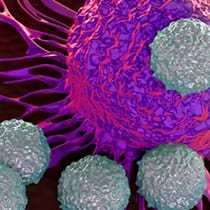NEW YORK, March 29, 2019 – CLS Therapeutics, Inc., today announced a poster presentation “First-In-Class-AAV-Based Gene Therapy For Pancreatic Cancer Based On The Destruction Of Cell-Free DNA with Vector-delivered DNase I” at the New York Academy of Sciences symposium “Cancer Metabolism and Signaling” being held on May 9, 2019, in New York City. The presentation includes the first animal data for the activity of AAV-based vector (in silico designed ) encoding DNase I of the treatment of pancreatic cancer animal model.
“These data in the animal model support our ongoing research program evaluating CLS-014 for the treatment of pancreatic cancer and other malignancies associated with elevated cfDNA levels pointing out that patients with these cancers associated with extremely poor prognosis have a new hope,” stated G. Tetz, MD, PhD, co-founder and Chief Executive Officer.
Presentation Details
Title: “First-In-Class-AAV-Based Gene Therapy For Pancreatic Cancer Based On The Destruction Of Cell-Free DNA with Vector-delivered DNase I”.
Summary: Background: In general, there is a balance between the level of serum cell-free DNA (cfDNA) and a plasma nuclease enzyme DNase I. Tumor progression is characterized by increased levels of circulating serum cfDNA that mainly originate from dead cancer cells and active release from both tumor cells and neutrophils. Increased levels of cfDNA are associated with tumor appearance and progression, mainly modulating TLR9 pathway or activating metastatic genes. The objective of this study is to evaluate the efficacy of AAV-based vector (in silico designed ) encoding DNase I.
Methods: We used BxPC-3-luc orthotopic model of BALB/c nude mice, with or without nab-paclitaxel injected with AAV vector with hyperactive DNase I transgene cassette. The mice were monitored for bioluminescence, weekly. Tumor size and metastasis were assessed at the end of the study (day 30).
Results: Treatment of mice with vector encoding DNase I demonstrated significant decrease in tumor bioluminescence (by more than 53%) compared to untreated control (p < 0.05). The number of ovary, kidney, spleen, and liver metastatic cells were significantly lower in group treated DNase I vector.
Conclusion: The study, for the first time, showed a potential in the cancer therapeutic strategy employing a gene-therapy approach allowing long term expression of DNase I and destruction of cfDNA.
CLS Therapeutics Inc., a preclinical-stage biopharmaceutical company developing next-generation gene therapy anticancer drugs, today announced that George Tetz, MD, Ph.D., Chief Executive Officer, presented the poster, “CELL-FREE TUMOR DNA AND NEUTROPHIL EXTRACELLULAR TRAPS AS NOVEL THERAPEUTIC TARGETS FOR PANCREATIC CANCER” at the Frontiers in Cancer Immunotherapy organized by the New York Academy of Sciences May 14-15, 2019, in New York, New York.
NEW YORK, NY / May 14, 2020 / CLS Therapeutics, a preclinical-stage anticancer gene therapy platform company developing novel medicines to bring the curative power of cell-free DNA destruction to patients with tumors, presented preclinical data on its AAV therapy clinical candidate, CLS-014, this week at the annual meeting of the American Society of Gene and Cell Therapy (ASGCT).
NEW YORK, NY / September 28, 2022 / CLS Therapeutics, an oncology-focused gene therapy company that utilizes Extracellular DNA and NETs as novel anticacer therapeutic targets, announces that its project entered the final of “Creating the World·Sailing to the Future” Innovation and Entrepreneurship Competition 2022 Hangzhou.


